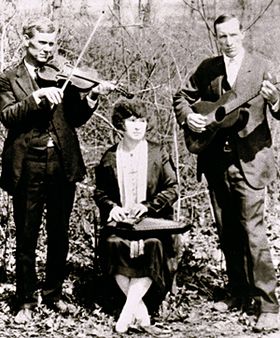Annotation:Hook and Line: Difference between revisions
No edit summary |
No edit summary |
||
| Line 22: | Line 22: | ||
''Turn that catfish wrong side out.'' <br> | ''Turn that catfish wrong side out.'' <br> | ||
</blockquote> | </blockquote> | ||
The east Tennesse group The Dykes Magic City Trio, who recorded the tune for Brunswick Records in 1927, sang: | [[File:MagicCityTrio.jpg|280px|thumb|right|John Dykes' Magic City Trio]]The east Tennesse group The Dykes Magic City Trio, who recorded the tune for Brunswick Records in 1927, sang: | ||
<blockquote> | <blockquote> | ||
| Line 49: | Line 49: | ||
''You ought to seed that 'possum racking through the land.''<br> | ''You ought to seed that 'possum racking through the land.''<br> | ||
</blockquote> | </blockquote> | ||
Basom Traywick (Marshville, Union County, North Carolina) used to perform the song/tune with his father at fiddling conventions and parties in the very early 20th century. The line he remembered was similar to Dykes' Magic Trio: | |||
<blockquote> | <blockquote> | ||
''Stradle the hook, straddle the line,''<br> | ''Stradle the hook, straddle the line,''<br> | ||
Latest revision as of 16:53, 8 November 2021
X:1 T:Hook and Line N:From the playing of fiddler John Dykes (c. 1882-1940's, with Dykes' Magic N:City Trio. "Magic City" referred to the planned community of Kingsport, Tenn., N:where the group members lived. M:C| L:1/8 Q:"Fast" R:Reel N:GDgd tuning (fiddle) D:https://www.slippery-hill.com/recording/hook-and-line D:Old Homestead OHCS 191, "Dykes Magic City Trio" D:Brunswick 128 (78 RPM), Dykes Magic City Trio (1927) Z:Transcribed by Andrew Kuntz K:G B-d3 d3(_B-|=B3)B A2G2|B-d3 dedc|BGAF G2[G2B2]| B-d2d- d4|(_B-=B2)B A2A-c|B2d2 dedc|BGAF G2[G2B2]|| +slide+B2BB BAGB|AGGG A2GG|(_B=B)BB {c}BAGB|AGGG G2GG| +slide+B2BB BAGB|AG[GB]G D2 [GB]B| (_B=B)BB {c}BAGB|AGGG G2GG| +slide+B2 Bd BAGB|AG[GB]G D2 [GB]B|(_B=B)BB {c}BAGB|AGGG G2GG| +slide+B2BB BAGB|AG[GB]G D2 [GB]B| (_B=B)BB {c}BAGB|AGGG [G2B2][G2B2]||
HOOK AND LINE. AKA and see "Banjo Sam," "Fish on a Hook," "Mr. Catfish," "Shout Lula/Shout Lulu." Old-Time, Breakdown. USA; Piedmont region of N.C., east Tennessee, western Virginia, northern & eastern Kentucky. GDad tuning (fiddle). Charles Wolfe (1982), writing on the country music of Kentucky, describes it as a driving banjo tune that was recorded by eastern Kentucky musicians in the 1920's. It has been said of that tune both that it was "Heard in many parts of the South but relatively rare" (Kerry Blech), and that it is "said to be the tune all Kentucky banjo players learn on" (Bill Mansfield). "Hook and Line" was in the repertoires of North Carolina musician Dock Boggs (as "Shout Lula") and of African-American fiddler Joe Thompson (who played it in FCgd tuning). Hobart Smith also fiddled the tune, as "Katy Went Fishing with Her Hook and Line," and said "It's a real old piece, handed down from my fathers." Mike Yates (2002) says the song may be based on an early minstrel tune called "My Old Dad," with African-American origins echoed in the version collected by Cecil Sharp from Ebe Richards of Callaway, Franklin County, Virginia, in 1918. Richards knew the song under the title "Jackfish (The)" (i.e. a chain pickerel), with the chorus:
O de lor de gal sindy, sindy,
Lor de gal sindy sue.
Dan Tate (b. 1894), of Fancy Gap, Carroll County, Virginia, sang it as "Fish on a Hook," with these words:
Fish on a hook, fish on a line,
Fish no more 'til the summer time.
Throw my hook to the middle of the pond,
Fish for the girl with a josy on.
See that catfish a-going upstream,
What in the hell does a catfish mean?
Fish that catfish by its snout,
Turn that catfish wrong side out.

Gimme the hook and gimme the line
Gimme that girl they call Caroline
Shout, Lula, shout, shout
What in the world are you shoutin' about.
A version with a similar opening was collected in 1905 in Kentucky, from the MS of C.B. House:
Give me the hook; give me the line;
Give me the gal they call Caroline.
Set my hook, give it a flip;
First thing I knowed, Dad's old lip.
Hook would break; pole would bend;
Bottom of the river old Dad would send.
N____r went a-fishing on a summer day;
Creek turned over, and the fish got away.
N____r went a-fishing in the summer time;
Creek turned over, and he went blind.
I went to the river and couldn't get across;
Jumped on a 'possum, and thought he was a horse.
The river was deep, and the bottom was sand;
You ought to seed that 'possum racking through the land.
Basom Traywick (Marshville, Union County, North Carolina) used to perform the song/tune with his father at fiddling conventions and parties in the very early 20th century. The line he remembered was similar to Dykes' Magic Trio:
Stradle the hook, straddle the line,
Give me the gal they call Caroline.

